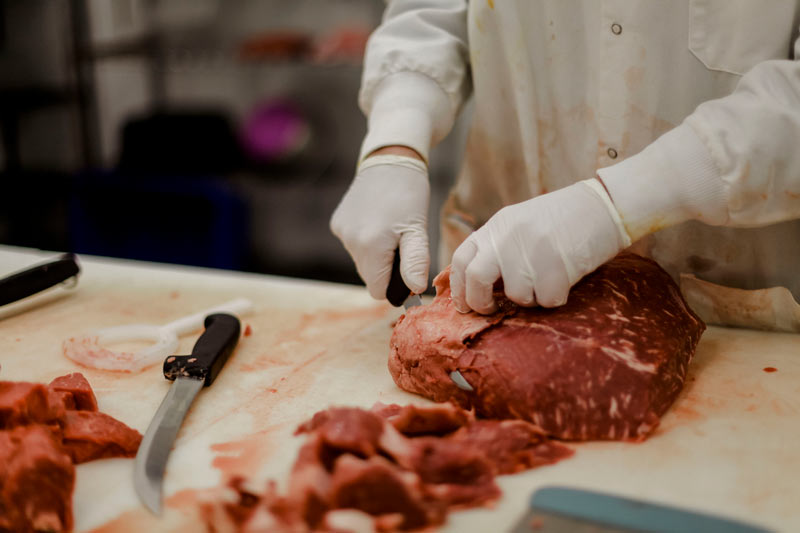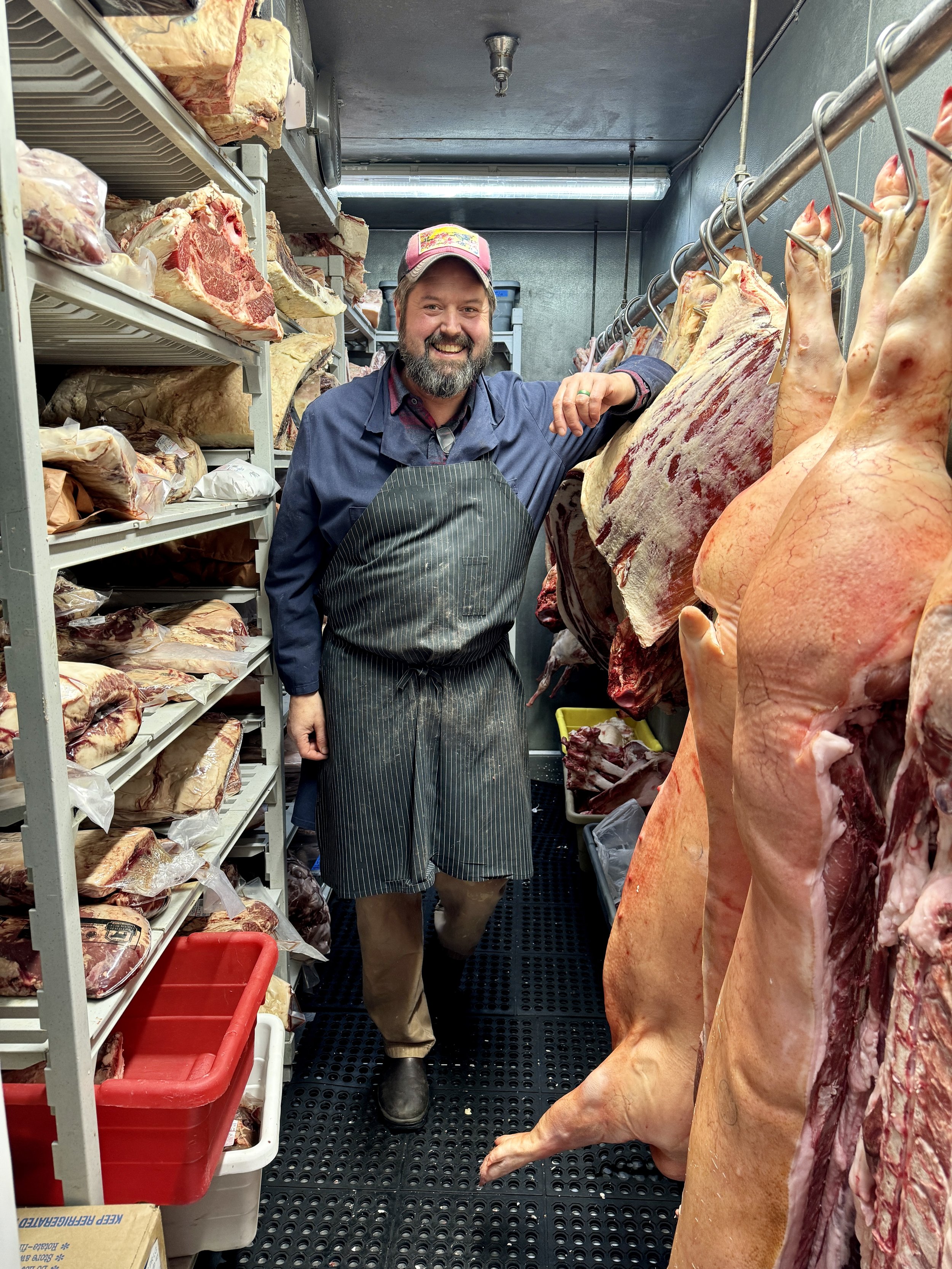Understanding why meat markets edwardsville il remains a trusted local choice.
Wiki Article
All Concerning Meat Markets: Comprehending Their Role in Sustaining Regional Farmers
Meat markets serve a critical feature in regional economic climates by linking the space in between farmers and customers. They offer a straight sales channel that boosts the freshness and quality of meat items. Beyond benefit, these markets play a considerable function in advertising lasting agriculture and supporting the incomes of regional farmers. The ramifications of this connection expand even more than one may expect, raising questions about sourcing techniques and customer selections.The Relevance of Meat Markets in Regional Economies
Although typically forgotten, meat markets play a necessary function in boosting local economic climates by supporting farmers and producing work. These establishments serve as essential middlemans, supplying a platform for local producers to sell their products straight to consumers. By acquiring locally sourced meat, consumers contribute to the sustainability of nearby farms, guaranteeing their practicality and promoting agricultural variety.Meat markets produce work opportunities, ranging from sales and butchers team to management and logistics functions. This work production boosts the regional economic situation, cultivating a feeling of community as citizens involve with their community businesses.
On top of that, meat markets often attract customers who seek top notch, fresh items, which can result in enhanced foot web traffic and sales for surrounding companies. On the whole, the presence of meat markets can significantly boost local financial health, strengthening links in between agriculture and area well-being while sustaining the resources of farmers.

Attaching Consumers and farmers: How Meat Markets Run
Meat markets function as important hubs that attach regional farmers straight with consumers, facilitating a structured supply chain that profits both events. By sourcing products from neighboring ranches, these markets assure that customers obtain fresh, top notch meat while sustaining regional farming. The operation of meat markets involves establishing relationships with farmers, usually permitting them to display their products and share their farming techniques.In turn, consumers gain access to a varied choice of meats that reflect local tastes and choices. Openness is a key facet of these markets, as consumers are commonly offered with information regarding the managing and sourcing of the meat. This direct connection fosters count on and commitment between farmers and customers, boosting neighborhood ties. Furthermore, meat markets regularly participate in marketing tasks, such as farm-to-table events, which additionally improve the customer's experience and awareness of local farming practices.
Promoting Sustainable Agriculture Practices
Advertising lasting farming practices is necessary for the future of food production and ecological wellness. By concentrating on ethical farming strategies, urging biodiversity, and advocating for seasonal and neighborhood sourcing, the agricultural field can greatly minimize its environmental impact. These methods not just sustain the community but additionally cultivate a much healthier connection between customers and farmers.
Moral Farming Techniques
An expanding number of farmers are embracing moral farming techniques to improve sustainability and minimize ecological effect. These techniques concentrate on accountable land administration, minimizing using chemical fertilizers and pesticides, and welcoming natural practices. Strategies such as plant turning, cover chopping, and agroforestry not only boost dirt health but also promote biodiversity. Additionally, farmers are significantly prioritizing animal well-being by giving pasture-based systems and lowering confinement techniques. By prioritizing local resources and area engagement, ethical farming promotes a durable farming system. This shift not just profits the atmosphere however additionally strengthens the link between farmers and consumers, urging educated getting decisions that sustain sustainable methods. Inevitably, these methods offer to develop a much more lasting future for agriculture.
Biodiversity and Environment Health
While many agricultural techniques have actually traditionally focused on return over environmental equilibrium, a growing recognition of biodiversity's value has emerged amongst consumers and farmers alike. Biodiversity boosts ecological community resilience, supporting soil wellness, parasite control, and pollination. By integrating diverse crops and livestock, farmers can develop a lot more stable communities that decrease dependence on chemical inputs and boost overall performance. Sustainable agriculture techniques that advertise biodiversity not just safeguard all-natural habitats yet additionally contribute to the lasting practicality of farming. Meat markets play a vital function in this standard change by supporting for regional products that prioritize eco-friendly wellness. By choosing to source from farms that welcome biodiversity, customers can support practices that guarantee a lasting future for agriculture and the setting.Local and seasonal Sourcing
Seasonal and local sourcing not just enhances the quality of food however likewise supports sustainable farming techniques that benefit both farmers and consumers. By prioritizing neighborhood meat markets, customers can attach directly with farmers, cultivating a sense of community and trust. This design minimizes the carbon impact connected with long-distance transport, advertising environmental sustainability. Farmers advantage from even more stable earnings and a dependable market for their products, which motivates accountable farming methods. Additionally, seasonal sourcing motivates varied farming methods, permitting farmers to rotate plants and livestock, therefore maintaining soil health and wellness and biodiversity. In general, this strategy creates a much more resistant food system that lines up with the values of area, sustainability, and top quality assistance, enhancing the important web link in between customers and regional farming systems.The Function of Openness in Sourcing Meat
What variables add to consumer rely on meat products? Transparency in sourcing is a crucial aspect. Customers significantly look for info about where their meat originates from, including the ranches and techniques involved in elevating the animals. Meat markets that focus on openness usually display clear labeling, describing the source and production techniques used. pastured meat This visibility cultivates self-confidence and permits consumers to make educated options.
Furthermore, transparent methods can consist of farm gos to, collaborations with regional farmers, and sharing stories concerning the pets and their environments. As customers end up being much more educated concerning food sourcing, they have a tendency to like meat products from vendors who are forthcoming with details. This need for transparency not just enhances consumer depend on but additionally encourages meat markets to develop ethical partnerships with neighborhood farmers. Eventually, openness supports a cycle of responsibility, benefiting both consumers and manufacturers in the meat market.
Sustaining Pet Welfare Through Local Sourcing
Supporting animal well-being with local sourcing depend upon the fostering of moral farming techniques. By prioritizing openness in sourcing, consumers can make enlightened selections that reflect their values. In addition, area involvement initiatives cultivate a stronger connection in between consumers and farmers, enhancing the total dedication to humane therapy of animals.Moral Farming Practices
While consumers progressively prioritize ethical factors to consider in their food selections, neighborhood sourcing provides a practical path to sustaining animal well-being. Honest farming methods emphasize humane treatment of pets, ensuring they have sufficient space, correct nutrition, and access to exterior atmospheres. Local farms frequently comply with these requirements, as they are extra visit homepage responsible to their customers and neighborhoods. By choosing to resource meat locally, consumers can sustain farms that focus on humane and lasting techniques over industrialized approaches, which commonly compromise animal well-being. This link cultivates a much deeper understanding of food manufacturing and encourages liable intake. Eventually, neighborhood sourcing equips customers to make enlightened selections that line up with their worths relating to moral therapy of animals in the food market.Transparency in Sourcing
Exactly how can transparency in sourcing boost consumer count on regional meat markets? By giving clear information regarding the beginnings of their items, regional meat markets foster a sense of responsibility and honesty. When consumers comprehend the sourcing methods, including the therapy of pets and farming methods, they are most likely to feel positive in their buying decisions. This openness allows customers to align their values with the businesses they sustain, knowing they are contributing to moral pet well-being and lasting techniques. In addition, local meat markets can showcase partnerships with neighboring farms, highlighting neighborhood support and enhancing a positive partnership in between customers and manufacturers. Inevitably, openness in sourcing not butcher meat packs only constructs trust fund however additionally encourages educated options amongst consumers.Neighborhood Interaction Initiatives
What duty do community interaction efforts play in advertising pet welfare with neighborhood sourcing? These initiatives significantly enhance understanding and understanding of honest farming techniques among customers. By cultivating links in between local farmers and community participants, meat markets can highlight the relevance of gentle therapy of pets. Educational workshops and farm tours permit consumers to witness firsthand the conditions under which pets are elevated, reinforcing the value of neighborhood sourcing. Furthermore, neighborhood events, such as farm-to-table suppers, highlight the connection between animal welfare and lasting practices. Through these interactions, customers create rely on neighborhood meat markets, motivating them to sustain moral fostering a culture and sourcing of liable consumption that prioritizes pet welfare in the area.Wellness Benefits of Deciding On Local Meat Products
Choosing regional meat items provides many wellness benefits that can considerably boost general well-being (farmer's meat market near me). One significant benefit is the decreased time between farm and table, which commonly leads to fresher meat with higher nutritional value. Neighborhood meats often tend to be devoid of unsafe chemicals and ingredients frequently found in factory-farmed options, adding to a cleaner diet planIn addition, regional farmers usually prioritize humane and lasting practices, causing much healthier pets that produce better-quality meat. Grass-fed and pasture-raised pets, regularly found in regional markets, usually have greater levels of omega-3 fats and reduced levels of saturated fats compared to their barnyard counterparts.
Sustaining regional meat items cultivates community health and wellness by making sure that customers have accessibility to secure and responsibly sourced food. By picking local, individuals not only nourish themselves but additionally add to the health of their community and environment.
Making Educated Selections at the Meat Market
When traversing a meat market, recognizing the key aspects that affect high quality and sourcing can encourage consumers to make educated choices. Customers must focus on neighborhood items, which often come from farms with lasting practices. Recognizing tags such as "grass-fed" or "organic" can additionally assist choices, as these frequently indicate higher welfare requirements and dietary benefits.Involving with the butcher is important; educated team can give understandings right into the sourcing of their meats and recommend cuts that fit various food preparation approaches. Consumers are encouraged to make inquiries regarding the farm's methods, consisting of animal treatment and feed.
Furthermore, examining the meat's shade and texture can disclose quality and top quality. Lean cuts must appear wet and bright, while fatty cuts ought to have a marbled appearance. By incorporating these methods, consumers can confidently pick meats that line up with their values and support regional farming.
Frequently Asked Inquiries
What Kinds of Meat Are Many Commonly Cost Regional Meat Markets?
Local meat markets usually supply a selection of meats, consisting of beef, poultry, pork, and lamb. These establishments often feature specialized cuts, sausages, and in your area sourced items, accommodating varied culinary choices and customer demands.Exactly How Can I Discover a Meat Market Near My Place?
To discover a meat market close by, one can make use of on the internet maps, online search engine, or regional directories - bagleys edwardsville il. In addition, asking neighbors or buddies for recommendations usually produces useful understandings into the ideal neighborhood choices availableExist Seasonal Variations in Meat Schedule at Meat Markets?
Seasonal variations in meat accessibility at meat markets frequently happen, influenced by factors such as local farming methods, pet reproduction cycles, and seasonal need. This can impact the types and amounts of meat used throughout the year.Do Meat Markets Offer Unique Promotions or Price Cuts for Bulk Purchases?
Meat markets frequently offer unique promotions and discount rates for bulk purchases. This technique urges clients to get larger quantities while allowing the markets to take care of supply effectively, profiting both customers and business economically.Can I Request Particular Cuts of Meat at the Market?
Yes, customers can typically ask for details cuts of meat at the market. Many butchers want to accommodate special orders, making certain that patrons get the exact cuts they desire, tailored to their choices.By sourcing items from close-by farms, these markets guarantee that customers obtain fresh, top notch meat while supporting local agriculture. By focusing on local meat markets, customers can attach straight with farmers, promoting a feeling of community and trust. How can openness in sourcing boost customer trust in neighborhood meat markets? Regional meat markets generally supply a range of meats, including beef, pork, lamb, and hen. Seasonal variants in meat accessibility at meat markets usually happen, influenced by elements such as regional farming practices, pet breeding cycles, and seasonal need.
Report this wiki page